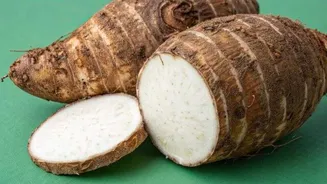Ginger's Powerful Impact
Ginger, a common spice in Indian kitchens, is celebrated not only for its culinary use but also for its potential health benefits, especially regarding
blood sugar regulation. Research suggests that ginger may improve insulin sensitivity, which is essential for glucose uptake by cells. Ginger's active compounds appear to reduce oxidative stress and inflammation, both of which can affect blood sugar levels. Consuming ginger regularly, perhaps in the form of tea, might offer a natural approach to support metabolic health. Including ginger in your diet could be a simple yet effective way to enhance your well-being. It is important to incorporate ginger into your lifestyle and track changes for better results.
Cinnamon's Sweet Secret
Cinnamon, cherished for its warming flavor, has shown promise in managing blood sugar. Studies indicate that cinnamon can mimic insulin's effects, enhancing glucose transport into cells. This action could lead to decreased blood sugar levels post-meal. Moreover, cinnamon might improve insulin sensitivity. Regular intake of cinnamon, as a spice or tea, could contribute to improved blood sugar control. Incorporating cinnamon into your diet might provide a delicious and healthy way to support your metabolic health. It's wise to use cinnamon moderately and observe your body’s response.
Turmeric's Curcumin Boost
Turmeric, a staple in Indian cuisine, contains curcumin, a compound with potent anti-inflammatory and antioxidant properties, which is essential for maintaining stable blood sugar levels. Chronic inflammation can disrupt insulin function, and curcumin's anti-inflammatory actions may protect insulin-producing cells. Studies suggest that turmeric can help improve insulin sensitivity and reduce blood glucose levels. Including turmeric in your diet could provide significant benefits for your overall health. Combining turmeric with black pepper increases curcumin absorption, boosting its effectiveness.
Green Tea's Metabolic Edge
Green tea, packed with antioxidants, has demonstrated an impact on blood sugar regulation. Research indicates that the compounds in green tea could enhance insulin sensitivity, which is crucial for managing blood sugar. Green tea may also help slow the release of sugar into the bloodstream, preventing spikes in blood glucose after meals. Regular consumption of green tea could support stable blood sugar levels and contribute to improved metabolic health. Enjoying green tea regularly could be a refreshing and beneficial addition to your routine.
Fenugreek's Support System
Fenugreek, a common ingredient in Indian cooking, contains soluble fiber and compounds that may assist in managing blood sugar. Fenugreek can slow down the digestion and absorption of carbohydrates, preventing sharp increases in blood sugar after eating. Studies suggest that fenugreek seeds might enhance insulin sensitivity and improve glucose control. Incorporating fenugreek into your diet, like consuming fenugreek tea, could offer a natural approach to supporting blood sugar management. Use fenugreek with caution, and monitor your response.













